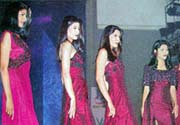Commentary/Ashok Mitra
Haute couture, threatens to become indistinguishable from the cult of nudity
 The process does not end here. A supposedly free society insists
on the unrestricted dissemination of views and opinions of all
conceivable shades. It also permits such views and opinions to
influence the mind of all voters. In the circumstances, the free
will of an individual citizen no longer bears the solidity of
a fortress; exogenous ideas violate its defences. The sequence
that follow is straightforward enough.
The process does not end here. A supposedly free society insists
on the unrestricted dissemination of views and opinions of all
conceivable shades. It also permits such views and opinions to
influence the mind of all voters. In the circumstances, the free
will of an individual citizen no longer bears the solidity of
a fortress; exogenous ideas violate its defences. The sequence
that follow is straightforward enough.
Man is a social animal;
he loves company, he also loves to act, more often than not, in
the manner the company does. Out of free will emerges the notion
of surrendering this free will: if opinion polls say X is going
to be the likely winner, why be a deviant, why cannot you just
suppress your private feelings about X, and vote along with re
rest, thereby ensuring his victory?
The communications network has therefore made mincemeat of free
will. A certain destiny, the opinion polls assert, awaits the
nation. Confronted by his datum, the basic urge to exercise free
will gets shrivelled, the other instinct, to vote in the way the
neighbours do, takes over. Free will loses out to statistical
prognostications.
Further questions inevitably arise. If everything is to be predetermined
by information technology, including the decision on who is to
be the next president of the world's most powerful country, why
take the trouble of ambling across to the polling booth at all?
This dilemma cannot be wished away.
Once major pollsters reach
near-unanimity on the outcome of the presidential election scheduled
for the first Tuesday following the first Monday of November,
the American voters have been increasingly tempted not to exercise
their franchise; compared to 1992, a perceptible decline has been
discernible in the proportion of registered voters who exercised
their right of franchise this year.
We are witnessing the phenomenon of, so to say a curve turning
upon itself. In countries where levels of literacy and awareness
are low, participation in polls is also generally poor. Political
consciousness being either non-existent or dormant, it could hardly
be otherwise.
As literacy advances and political parties begin
to organise themselves and mobilise the voters, the proportion
of the electorate crowding the polling booth, patiently waiting
their turn to cast their democratic ballot, goes up and up. The
tendency reverses itself though at a particular point.
Opinion polls, it is assumed, have already decided the issue;
in countries with 100 per cent literacy and comfortable standards
of living, increasingly larger proportions of voters are therefore
opting out of the prerogative of exercising their franchise. Between
a nation with only rudimentary levels of literacy and social awareness
and one exceptionally sophisticated in terms of all conceivable
definitions no distinction can be drawn henceforth in the matter
of actual voter participation in democratic elections. Knowledge
and knowledgelessness have come to rest on the same pedestal.
In such an ambience, hucksters and demagogues find it to be child's
play to win electoral battles making use of the paraphernalia
made available by information technology; recourse to vote-rigging
of any description is not required to be put on the agenda any
more.
Come to think of it, howsoever sharply differing in their
externalities, participation in the electoral process in the United
States of America and Rwanda has, for instance, now acquired such
a quantitative proximity that we are hurtled into the thick woods
of elitesque philosophy; the beginning is the end, and vice versa.
Do not other parallels abound too? Primitive man and his woman
romped naked. In due or undue course, they discovered shame, and
leant to hide their bodies behind apparel and other embellishments.
even as the present millennium is about to close, an opposite
trend has been vigorously set in motion.
Fashion designers and
organisers of beauty pageants are furiously at work to design
clothing which reveal more and more parts of the human anatomy,
Haute couture, threatens to become indistinguishable from
the cult of nudity. It was unclad existence at the beginning of
human history; we seem to be harking back to that state. In our
beginning is our end; the shame of being unclothed no longer means
a thing.
Just as the sense of shame for being a felon is also fast coming
to a sure case, at least in some lands. Here too, it is a retreat
into history: in the uncivil society depicted by Hobbes, life
was nasty, brutish and short. Since everyone indulged in mayhem
and murder in order to survive, the concepts of crime and venality
were unknown. Does it not look like familiar territory?
|





 The process does not end here. A supposedly free society insists
on the unrestricted dissemination of views and opinions of all
conceivable shades. It also permits such views and opinions to
influence the mind of all voters. In the circumstances, the free
will of an individual citizen no longer bears the solidity of
a fortress; exogenous ideas violate its defences. The sequence
that follow is straightforward enough.
The process does not end here. A supposedly free society insists
on the unrestricted dissemination of views and opinions of all
conceivable shades. It also permits such views and opinions to
influence the mind of all voters. In the circumstances, the free
will of an individual citizen no longer bears the solidity of
a fortress; exogenous ideas violate its defences. The sequence
that follow is straightforward enough.